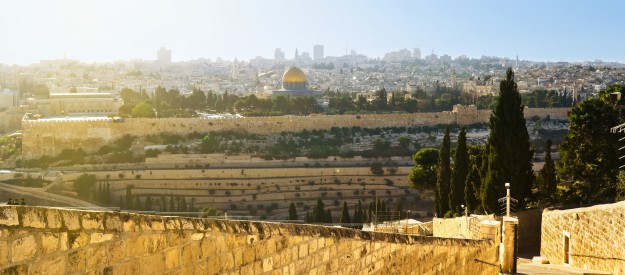"We are losing our attitude of wonder, of contemplation, of listening to creation and thus we no longer manage to interpret within it what Benedict XVI calls 'the rhythm of the love-story between God and man.'"
+ Pope Francis
Interfaith sustainability in Jerusalem

News from the Holy Land is often of disputes. But there are issues that unite its people. One of those is ecology.
Thanks to the work of the Jerusalem-based Interfaith Center for Sustainable Development, men and women of various faiths are discussing sustainability—and they're seeking ways to come together and achieve it.
Rachel Winner of the Center spoke with me on Thursday as conflict was stirring outside her window. She apologized for the noise but didn't let it impede our conversation about stewardship.
Rachel grew up in North Carolina. She's spent lots of time around the word helping people come together to develop sustainable lifestyles. You can tell she loves her work.
When asked what current project she's most excited about, she mentioned the “Woman’s Conference”—a gathering for women from East and West Jerusalem—which is predominantly Arab Muslim and Jewish, respectively.
Offering such gatherings means that “even though it’s the same city you’re crossing major borders to get those two groups together,” Rachel said. “But what came from that is the desire to continue and to do so with smaller events” to help participants get to know each other better.
“So in April we began a consistent series of smaller meetings—really informal opportunities to get to know the other person. We did gardening, we held a picnic.” She said that going forward, the Center’s goal is to develop a curriculum for a nine-month or a year-long program to give women tools to discuss faith and ecology.
“That way they can go back to their communities and advocate for change for environmental policies.”
Rachel and the Interfaith Center for Sustainable Development also work with the United Planet Faith and Science Initiative, which hopes to foster dialog between faith and science, particularly to address climate change. Leadership members include not just religious leaders but also scientists that are directly involved with international climate efforts.
The hope of the Faith and Science Initiative is to use modern communication opportunities to bring even more faith and scientific leaders together (virtually, that is) to strategize on both macro and micro levels—to create working groups around various policy activities. And to get to know each other.
“One of our missions is to educate faith leaders because the Center recognizes the incredible value that faith brings in helping change society.”
The Center’s work of fostering dialog takes place on the international stage and on local ones. In October the Center coordinated with the Faith and Science Initiative to hold an interfaith conference in Jerusalem. The goal was to educate current and future religious leaders on what science tells us about our relationship with creation, and how faith holds a unique influence over the way society treats it.
Many of those in attendance were Catholic—most of those were seminarians from the Salesian Order’s Studium Theologicum Salesianum at the Ratisbonne Monastery in Jerusalem. (The seminary's website has a nice summary of their involvement at the ecology conference.)
Rachel adds happily that the Salesian’s have expressed interest in coordinating future events with the Interfaith Center and with other Catholic organizations. (Editorial Note: As a result of my conversation with Rachel, I’ve reached out to the Principal of the seminary, Fr. Biju Michael SDB, who has agreed to be interviewed with Catholic Ecology in the next few weeks. Stay tuned.)
But of course while much good work has been achieved and is underway, there’s much more to do. I asked Rachel about the greatest ecological needs she sees in the Holy Land. Is it water pollution? Biodiversity? Climate change? All of the above?
“It’s definitely all of the above—which is both the simple and complicated answer.”
She says that while the main focus of the United Planet Faith and Science Initiative is climate change, “we come at it from an overarching perspective.” And by that, she doesn’t mean the scientific nuances—which of course have their own place and their own experts within the organization.
The greater focus is to tackle environmental issues by confronting “consumerism, and greed, and short-term thinking.” It is those areas, Rachel notes, that religion has great influence—even if not all religious people appreciate the natural environment.
Even in Jerusalem there are, for instance, the occasional plastic cups thrown on the ground as people go off to pray—a very small symptom of larger issues that the Interfaith Center for Sustainable Development is busy engaging through policy, science, and most of all, with prayer.
Stay tuned as Catholic Ecology continues to chronicle future activities of the Center and of the United Planet Faith and Science Initiative.
And as always, keep them in your prayers.


















